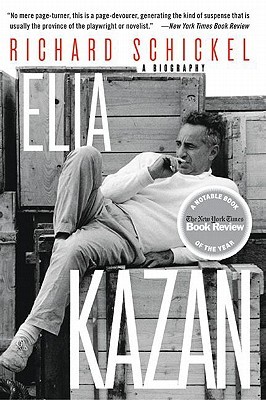
Elia Kazan
کتاب های مرتبط
- اطلاعات
- نقد و بررسی
- دیدگاه کاربران
نقد و بررسی

August 29, 2005
When the Academy of Motion Picture Arts and Sciences decided to give Kazan (1909–2003) an honorary Oscar in 1999, it rekindled the lingering resentment over his testimony before the House Un-American Activities Committee nearly 50 years earlier. Schickel, who produced a short film for the Academy's presentation and covered the controversy in his role as Time
's movie critic, has virtually no sympathy for Kazan's detractors, arguing that HUAC was "a harsh and permanent fact of American life" in the early Cold War era and, more importantly, that Kazan was testifying against Stalinists, not innocent liberals. He also observes that Kazan's early efforts at self-defense may ironically have worked against him, sealing his image in the public eye. The biography's main goal, however, is to restore Kazan's artistic achievements to their rightful prominence in his life story. Working with the director's extensive production notes, Schickel traces Kazan's rise from a fledgling actor in the Method-touting ensemble the Group Theatre to his creative pinnacle presenting Tennessee Williams on Broadway while making films like 1954's On the Waterfront
. Despite Schickel's friendship with his subject, this analysis is unsparingly thorough, to the point where Schickel's forceful, personalized criticism becomes as attention grabbing as Kazan's body of work. Photos. Agents, Don Congdon and Susan Ramer.

Starred review from September 15, 2005
From the end of World War II to the early 1960s, director Elia Kazan (1909 -2003) had an unparalleled string of triumphs on the Broadway stage and in Hollywood. A former actor, he worked with some of America's most gifted playwrights -Arthur Miller, Tennessee Williams, and William Inge -and showcased the talents of Marlon Brando, James Dean, and Montgomery Clift. Kazan also reluctantly named names before the House Un-American Activities Committee (HUAC) in 1952 -an act that earned him the enmity of his colleagues and later started a firestorm of controversy when he was awarded a lifetime achievement Oscar in 1998. Drawing on years of friendship with Kazan, as well as access to the director's thoughtful, meticulous production notes, esteemed movie critic and film scholar Schickel ("D.W. Griffith: An American Life") perceptively weighs each Kazan production, reserving the most space for key works like the stage productions of "Death of a Salesman" and "A Streetcar Named Desire" and overlooked or forgotten films like "Viva Zapata!" and "Wild River". Kazan's lifelong attachment to his identity as a first-generation immigrant, his views on the theater's role in promoting social change, and, of course, the still relevant argument of whether Kazan should have cooperated with HUAC are also addressed. This masterly meditation on a complex, conflicted, and underappreciated director deserves a place on the shelf beside Kazan's autobiography, "Elia Kazan: A Life". One of the year's best biographies; highly recommended for all collections on stage and screen history. -Stephen Rees, Levittown Lib., PA
Copyright 2005 Library Journal, LLC Used with permission.

























دیدگاه کاربران